Pick of the Litter: Student Finds Perfect Guide in Disney+ Star
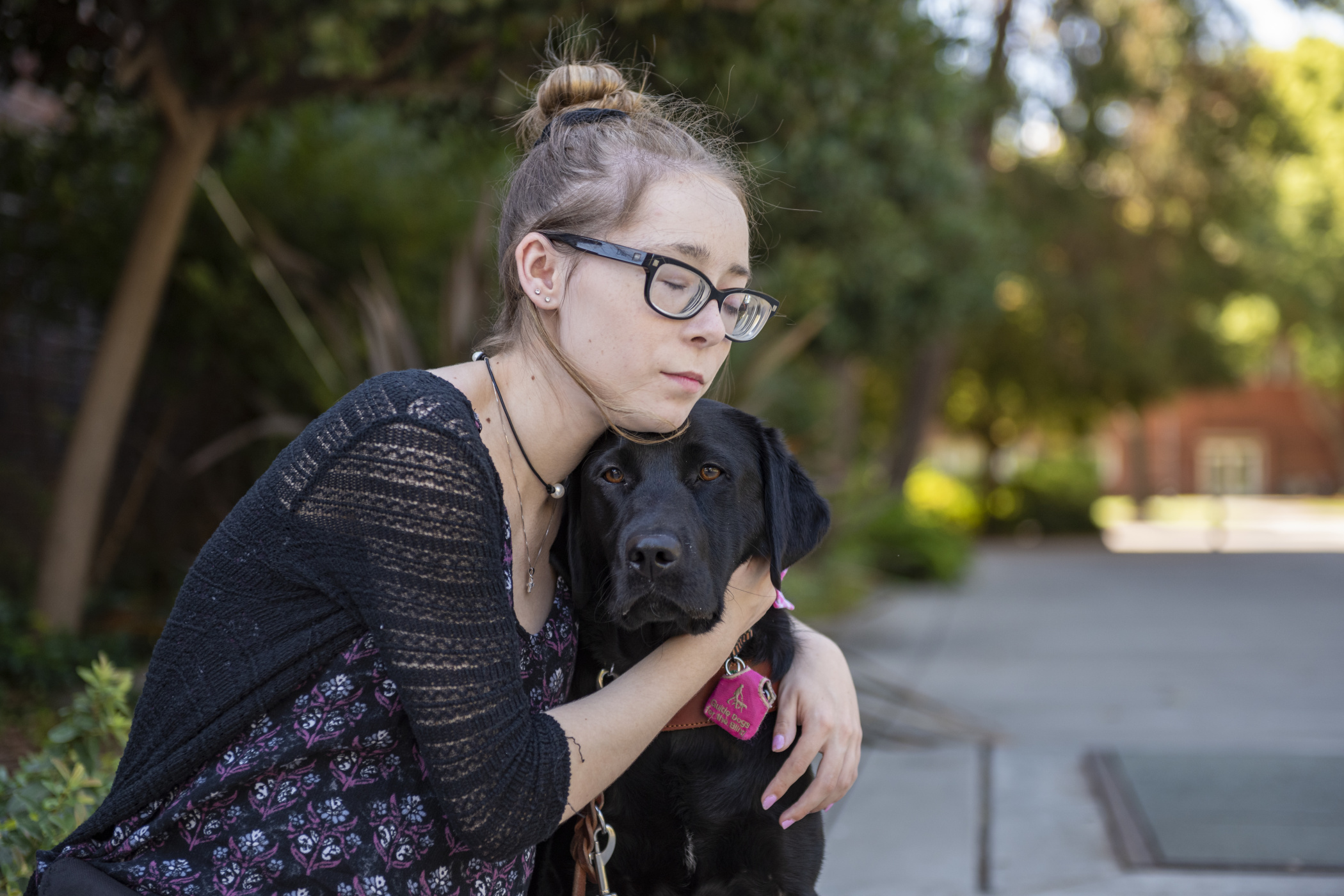
Chico State student Olivia Merz sits with guide dog Tartan during a filming for the Disney+ Series “Pick of the Litter” on Tuesday, July 30, 2019 in Chico, Calif. (Jason Halley/University Photographer/CSU Chico)
Hard-working, whip-smart, and wiggly as can be, Tartan is perhaps the best tool Olivia Merz has for her educational success.
Her Guide Dogs for the Blind companion not only helps her navigate campus and protects her from dangers she cannot see but she has given Merz confidence to be more outgoing in her classes and been a salve for her depression and anxiety.
Born with glaucoma and losing all sight in her right eye as a toddler, her remaining vision varies from day to day. For years, the child development major relied on a cane to navigate, sweeping the path in front of her for obstacles and scanning for indicators to help orient her direction.
“I’ve gone a long time without feeling independent,” she said. “I haven’t been able to look up confidently and walk in many years.”
Approaching their eight-month anniversary together, Tartan is not just Merz’s eyes and guide, she is her close companion, biggest fan, and a bit of a bed hog. Whether they are sitting in class, tabling in Trinity Commons, or hanging out with friends, the petite black Labrador retriever constantly checks on her with sweet almond eyes, nudging for reciprocal affection.
“Yes, I know you are cute,” the junior says, grinning as she pulls a piece of kibble out of her back pocket.
Their close connection was recently on display for the world thanks to Disney+’s Pick of the Litter, a six-part docuseries that chronicled six dogs on their quest to be the ultimate canine companion. The episode in which Merz and Tartan appeared dropped on the streaming service January 24.
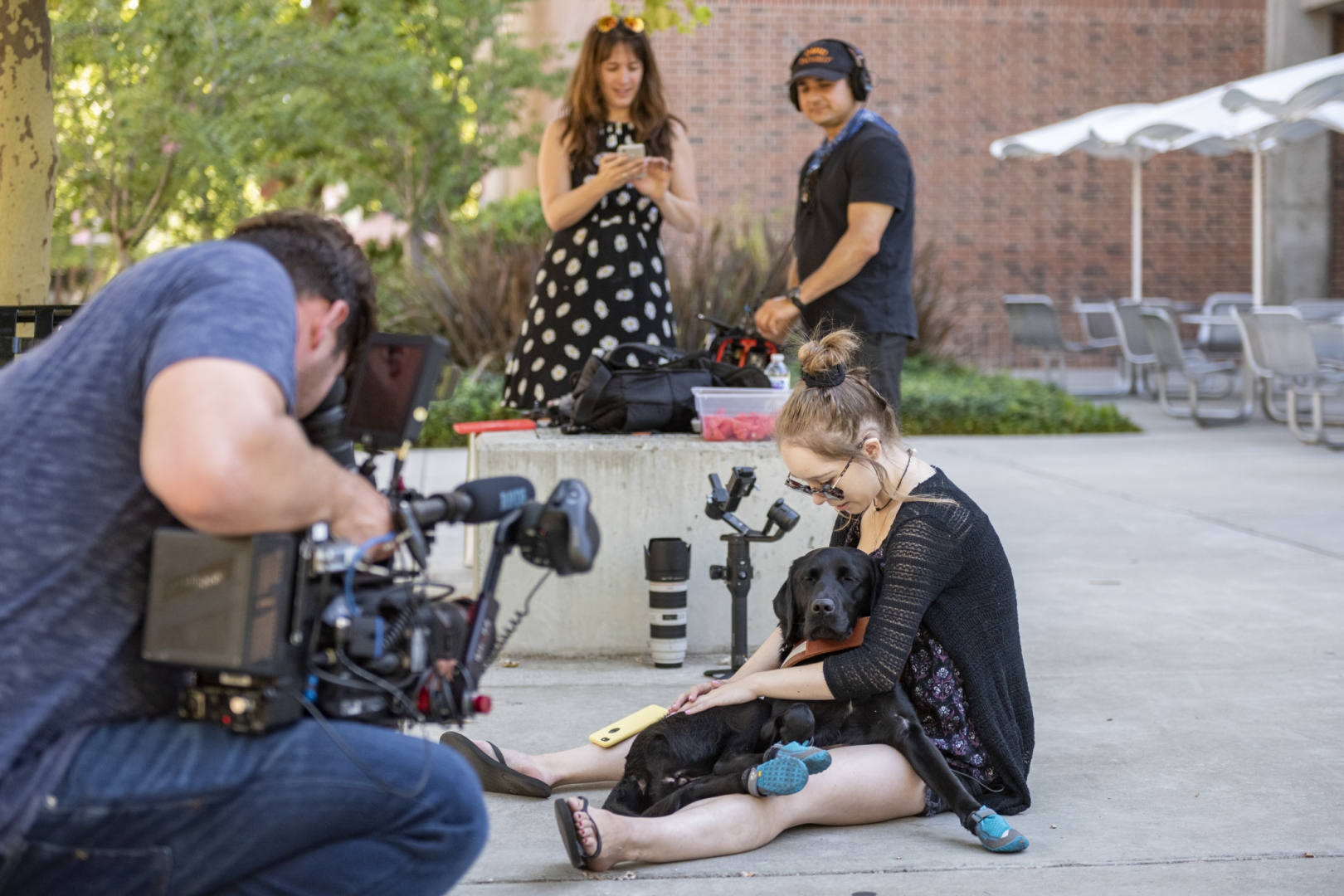
Upon meeting, it was love at first sight, as the college student cupped Tartan’s face in both hands, came nose to nose, and quietly stared into her eyes. The black lab washed her face in kisses, and their partnership was sealed.
“I couldn’t have asked for anything more,” she said. “She’s my life.”
Merz was born in Japan where her family was stationed in the military. Shortly after birth, she was medically evacuated to San Diego for severe health conditions and lived there for much of her childhood until they relocated to the Bay Area. She’s grateful to have been introduced early on to a community of people with visual impairments and who supported her through a host of health-related challenges.
She has wanted a guide dog since she was 16 years old.
“A big part of me thought I was too sighted, which is something people who are blind don’t often think about,” she said.
In reality, guide dogs help people with a range of visual impairments and Merz found she was a good candidate. At best, Merz can make out rough shapes and colors that are 10–20 feet away. At worst, migraines rob her of her remaining sight and the world goes dark. Depth perception and distance are always a challenge.
Leaving the Bay Area, where she had become enmeshed in a community of people with visual impairments, she found herself feeling alone when she arrived in Chico two years ago. It seemed few people had ever met a blind person or knew anything about blindness. The reaction she had while navigating campus with a cane was not always a positive one.
“[People] didn’t know what was in my hand, that I ran into things for a reason, that they can run into me,” she said, of fellow students and campus foot traffic.
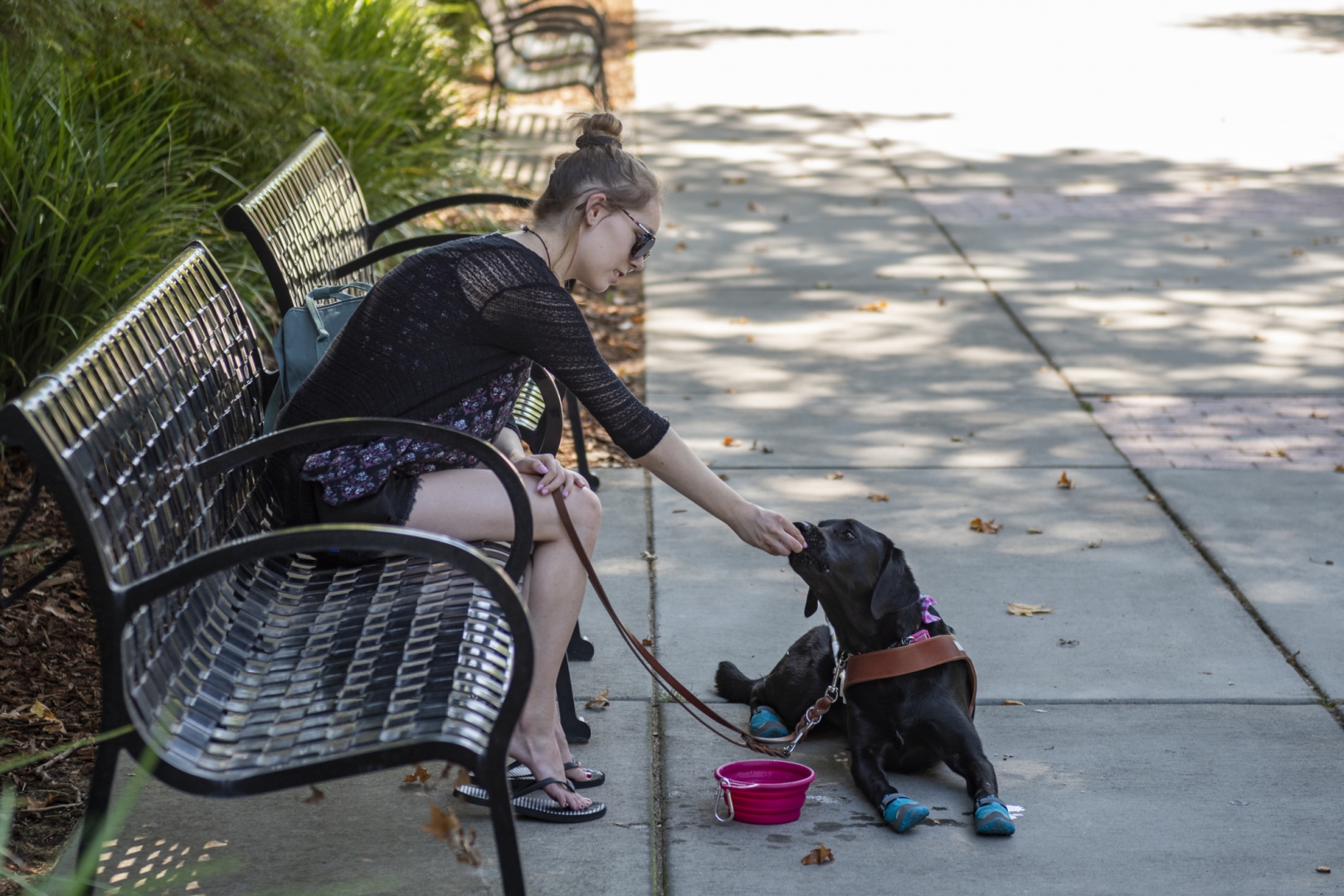
The flatness of the campus is, for the most part, navigable, although some stretches of buckled asphalt are a struggle and most stairs are uniform in color, so their height and depth are impossible to determine with her limited sight. For her freshman and sophomore years, she charged forward with a determined and resilient spirit, but often found herself discouraged.
In fall 2018, her mother encouraged her to fill out an application with Guide Dogs for the Blind. Merz was accepted almost immediately, and after evaluation of her home, mobility, and cane skills, she was scheduled for training in June 2019.
She began thinking about experiences in terms of “last.” “This is my last Christmas without a guide dog.” “This is my last class without a guide dog.” Summer could not come fast enough.
However, after working so hard for so long to navigate the world alone, it was a bit nerve-wracking to relinquish the responsibility to a dog, she said. She knew she had to trust the training.
For two weeks, she lived at the Guide Dogs for the Blind campus in San Rafael, where she underwent intensive theoretical lectures, discussions, and tests similar to her college environment. She also learned how to communicate and direct a guide dog, redirect the dog’s focus, detect deviations in her line of travel, and care for the dog’s physical and emotional needs.
Viewers of Tartan’s journey from puppy to trained guide on Pick of the Litter discovered the retriever was originally partnered with a college student from Texas, but it was ultimately determined the handler needed more mobility and orientation training before graduating to a guide dog. Guide Dogs for the Blind quickly realized the nonprofit had another great match for Tartan already in training—Merz.
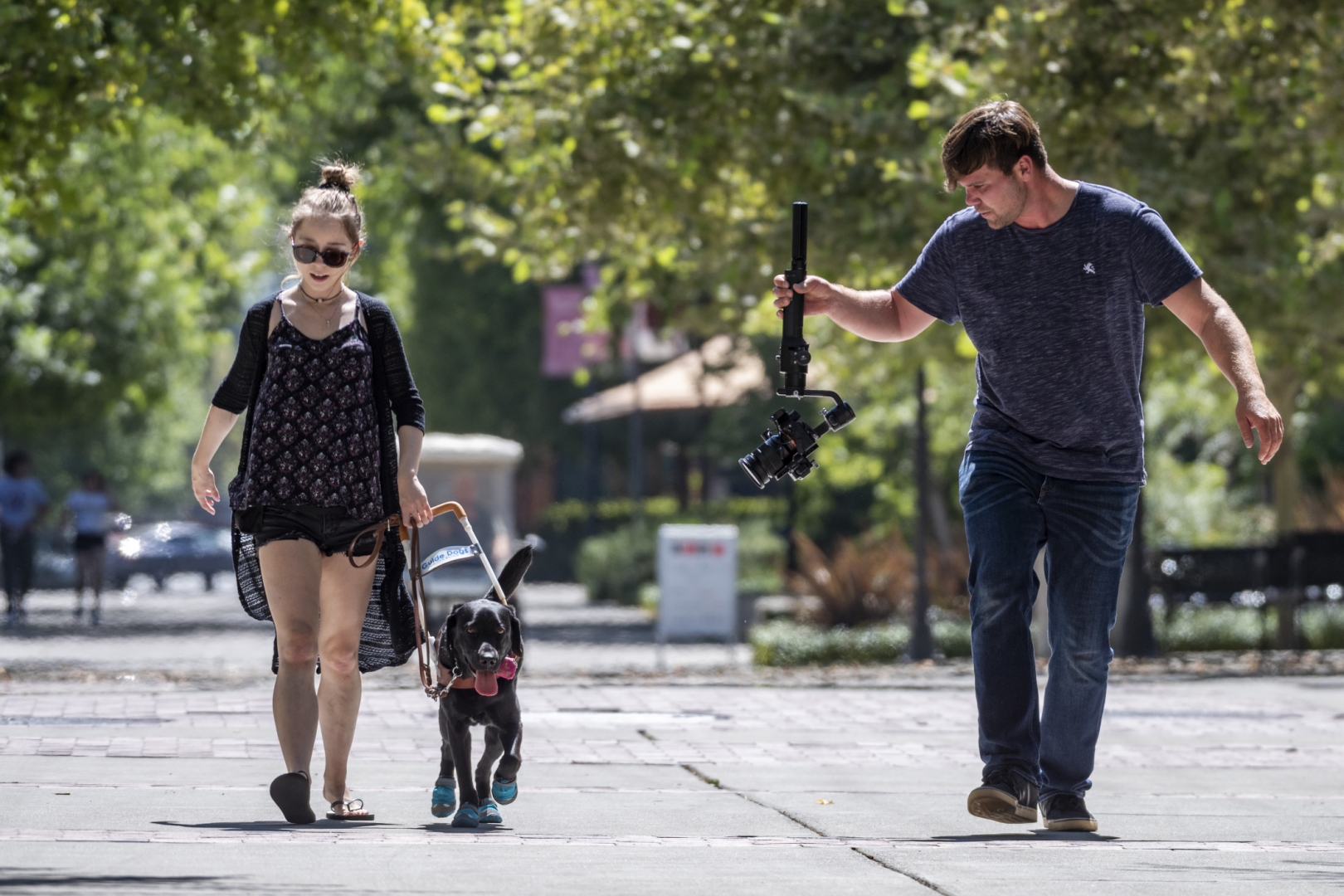
“I cannot imagine my life without her now,” Merz said, reaching out to pet Tartan’s velvet fur.
With the dog as her eyes, she empowers Tartan to proactively look out for obstacles and plan better routes. As their familiarity and training deepened, now Merz needs only to tell her to go to Modoc Hall, where most of her courses are, and her four-legged leader will stride confidently to their classroom.
“Sometimes I just need to close my eyes, and I can trust her to get me where I’m going,” she said. “She’s not a GPS, not a self-driving car, but I can be more relaxed.”
On Tuesday nights, Merz commands “Find Challenge,” and Tartan trots to Selvester’s Café-by-the-Creek for the Christian student club’s weekly meeting. And if she says “Find Escort,” Tartan takes her on a near sprint to Student Services Center, where they go to spend time with Accessibly Resource Center (ARC) Director Holly Hunt and her service dog, Escort. The playful pooches often get to take off their harnesses and enjoy off-the-clock time, tugging on toys and wrestling between cubicles.
Merz admits Tartan has done far more for her than transportation support. Her canine companion is also an emotional boost when classes, assignments, and exams become too draining. And she’s a buffer with new people. With Tartan by her side, Merz finds herself more confident to go to her faculty’s office hours and engage with classmates she doesn’t know.
While Merz feels she used to be antisocial, even misanthropic, she is now more extroverted and friendly. Sometimes she lets Tartan take a break from her work and they sit outside Meriam Library with her harness off so she can be an impromptu emotional therapy dog for other students. Merz cannot recall the number of times students approach her to say they had to leave their own dogs behind at home and gaze longingly at Tartan. She’s more than happy to give them the chance to pet her, as long as she’s not working.
However, the distinction of when and how to engage with a service dog remains one of her greatest challenges on campus, she said. She’d like to remind people to ignore service dogs when they see them, don’t talk to them, and don’t pet them. Never interrupt their work, and always ask the handler’s permission. Also, don’t make assumptions about the individual’s disability.
“It’s hard, because everyone loves dogs,” said Hunt, who has given Merz support and advice through ARC. “But her service dog provides her access to education. If people interfere with Tartan, they are interfering with Olivia’s education.”
Besides Tartan and Hunt’s dog Escort, who she was paired with through Dogs4Diabetics three years ago, there is only one other registered service dog and one puppy-in-training on campus, which means people’s unfamiliarity often leads to missteps. Off-leash pet dogs can be particularly problematic, and even humans saying hello can reinforce distracted behavior, Hunt said. Ultimately, when someone interferes with a service dog, it can negate its training and be downright dangerous.
But, as Merz’s confidence and passion for service dog advocacy grow, Hunt is glad to have another duo on campus to help educate the public. The fact the two were on a popular streaming service in a dedicated show about service dogs—and the fact the docuseries even exists—says a lot about becoming more mainstream.
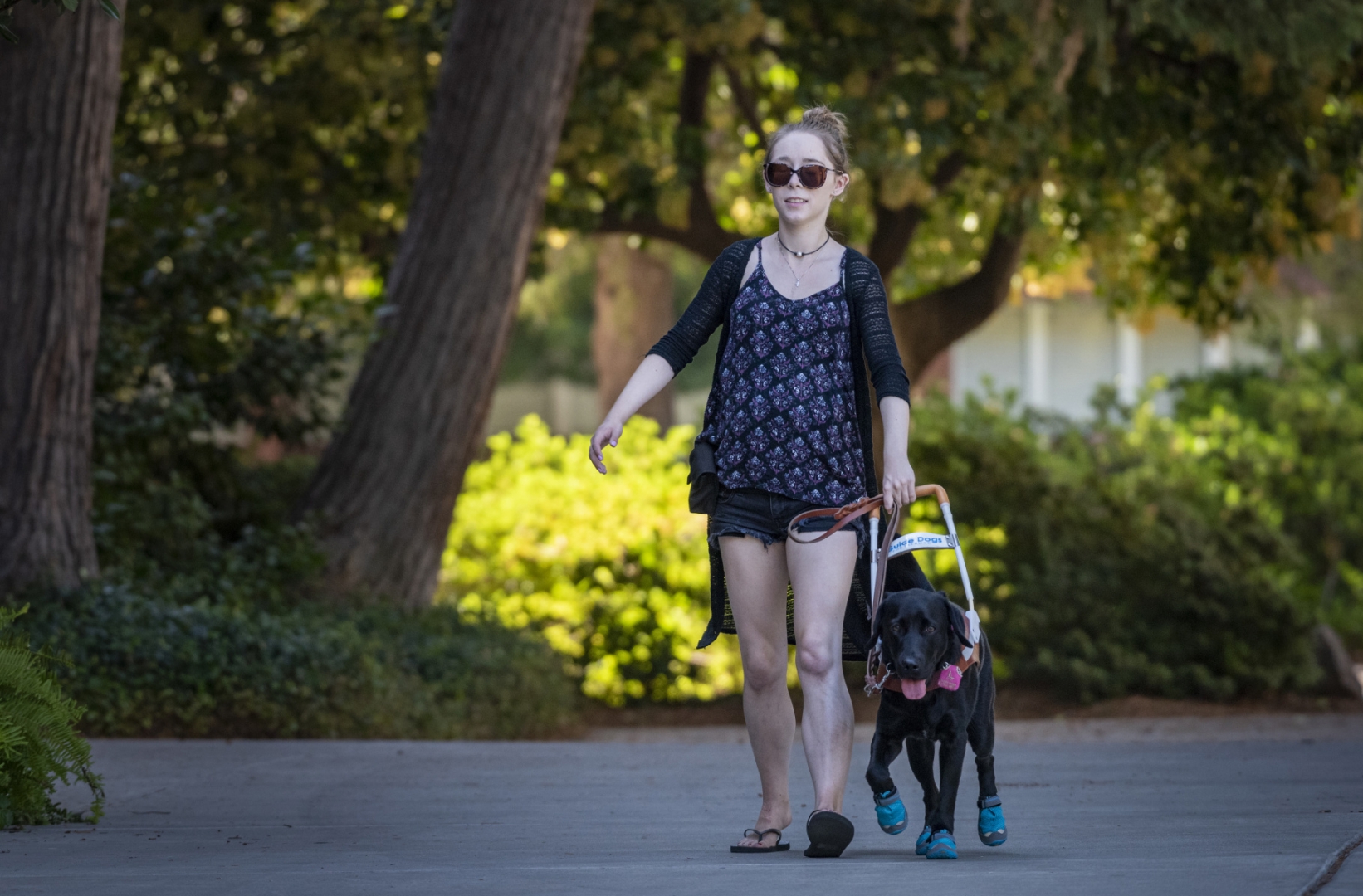
Merz hopes to continue raising awareness about the critical need and benefit of service dogs. One of the ways she’s doing so is by sharing their journey on Tartan’s Instagram account where she posts about their everyday activities.
“I want people to know about guide dogs,” Mertz said. “I want people to know about blind culture and disabilities in general.”
During her child development internship last fall, she assistant taught at Innovative Preschool, which is an inclusive program for students with special needs. As she and Tartan worked with small children, especially those with visual impairments, she affirmed for herself that she’s following her career dreams.
After graduation, she hopes to get her teaching credential at San Francisco State, with a focus on visual impairment. In bringing her guide dog into schools and supporting children’s education, she hopes to foster their independence in the way she longed for when she was young.
“[Tartan] definitely has made me more motivated,” Merz said. “She has made me feel like I can conquer school again. This is where I was meant to be.”


